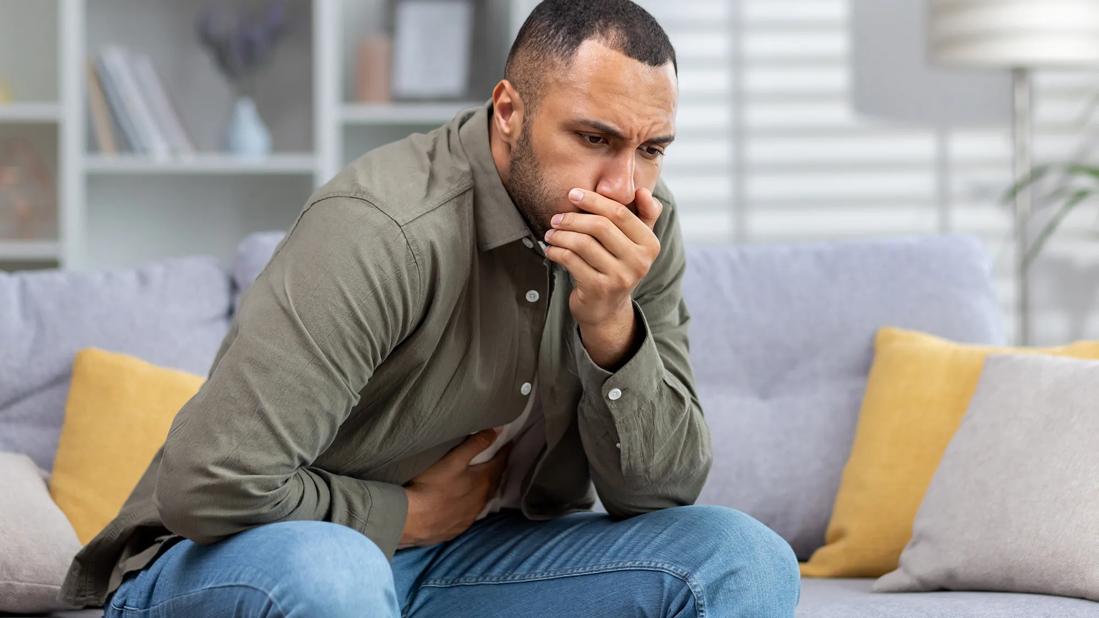Nausea, fullness, heartburn and unexplained weight loss may signal that something is going on with your GI system

We can all get an upset stomach or a little heartburn from time to time when our digestive system acts up. But when are gastrointestinal (GI) issues a sign of something more?
Advertisement
Cleveland Clinic is a non-profit academic medical center. Advertising on our site helps support our mission. We do not endorse non-Cleveland Clinic products or services. Policy
Oncologist Suneel Kamath, MD, discusses the GI symptoms that can be early warning signs of stomach cancer and when to talk to a doctor.
Stomach cancer, also called gastric cancer, happens when there’s abnormal cell growth in your stomach. Early symptoms will depend on where the tumor is located and what stage it is.
But here’s the thing: Early symptoms of stomach cancer are often so vague and unremarkable that they may not set off any alarm bells. It’s easy to confuse them with a variety of noncancerous (benign) GI disorders.
“These symptoms tend to be dismissed as normal GI issues because for many people, that’s all they are,” Dr. Kamath says. “Unfortunately, that means that when stomach cancer is finally diagnosed, it’s often in the advanced stages.
Dr. Kamath shares some common GI issues that could mean something more.
“Early satiety” means you feel full even after you’ve only eaten a small amount of food. You may notice that you feel stuffed long before you’ve made it through a full meal — or even part of one.
“You may only be able to eat 20% of what you would normally eat,” Dr. Kamath says.
“Stomach cancer can make the wall of your stomach very rigid and shrink its capacity to store food,” Dr. Kamath explains. “In cases where the stomach cancer spreads to the lining of the abdomen, it can cause fluid to collect in your abdominal cavity.”
Advertisement
This bloating makes your stomach feel full and tight. In severe cases, it can even become visible, resembling various stages of a pregnancy belly.
Heartburn is a burning pain in your upper chest and throat. It’s common and not usually something to be too concerned about (especially after a night of eating hot wings or pizza). But ongoing heartburn may be cause for concern, especially if it doesn’t go away with antacids or other medications.
When a growth is blocking the exit of your stomach, the foods you eat and the liquids you drink can’t make their way to your duodenum (the first part of your intestine). This can lead to nausea and even vomiting.
“When that’s happening, the food you eat has nowhere to go,” Dr. Kamath says. “That sends signals to your brain that cause you to experience the sensation of nausea.”
If you’re experiencing symptoms like nausea, vomiting and bloating, you may cut back on how much you eat in an effort to avoid feeling sick. Or you may just not have your usual appetite.
“People no longer feel hungry and ultimately start losing weight without trying,” Dr. Kamath reports. “That’s probably the most concerning symptom.”
Take note if the color of your stool (poop) changes to become very dark, tarry and especially smelly. This is called melena, and it’s a symptom of internal bleeding. Though it’s not a common symptom of stomach cancer, it’s possible.
“If it’s a very slow bleed, you may not notice anything in your stool,” Dr. Kamath notes.
Fatigue has many possible causes, from lifestyle habits to sleep disorders to physical and mental health conditions. But when it’s paired with unexpected weight loss, it may be a sign of cancer.
“Slow blood loss can lead to anemia, a low hemoglobin level that can cause exhaustion,” Dr. Kamath explains.
Sometimes, you may just have a feeling that something is off — even if you can’t explain exactly why.
“It can feel like bloating,” Dr. Kamath says. “Your belly just may feel heavy.” This general feeling of discomfort may be due to stomach cancer spreading to the lining of your abdomen.
If any of the above symptoms persist, don’t hesitate to see a healthcare provider. It’s always best to get them checked out, so if you do need treatment, you can get it as soon as possible.
“Your doctor will do a comprehensive evaluation to determine whether (and how) to further investigate,” Dr. Kamath explains.
But if you’re experiencing GI symptoms, do your best not to panic. Many of these symptoms can also be the result of conditions and concerns that are both common and easily treatable.
“Our gastrointestinal systems can be fickle,” he acknowledges. “Your provider can help you get to the bottom of things, but most of the time, GI symptoms are not from stomach cancer — they have benign causes.”
Advertisement
Learn more about our editorial process.
Advertisement

Prioritizing nutrition and physical activity are key to staying strong and energized

Your relationships with food, physical fitness, social interactions and advance planning desires may need to be modified

Stomach cancer tends to spread to the lymphatic system and liver before moving to other areas

A small percentage of gastric cancer is genetic

Gallstones can block bile in your biliary system and lead to pain and discomfort

The caffeine and natural acids in coffee may trigger acid reflux, but there are ways to lessen the effects

Wait a few hours, then start with water or ice chips, graduating to clear liquids and then, soft, bland foods

Bananas, rice, applesauce and toast are easy on your stomach, but they don’t have enough vitamins and nutrients for more than a couple days

The tropical fruit is a good source of antioxidants and vitamin C

Most people fall asleep within 10 to 20 minutes, but if your experience is different, adjusting your sleep schedule may help

Exploring your hidden side can lead to better understanding of what makes you tick